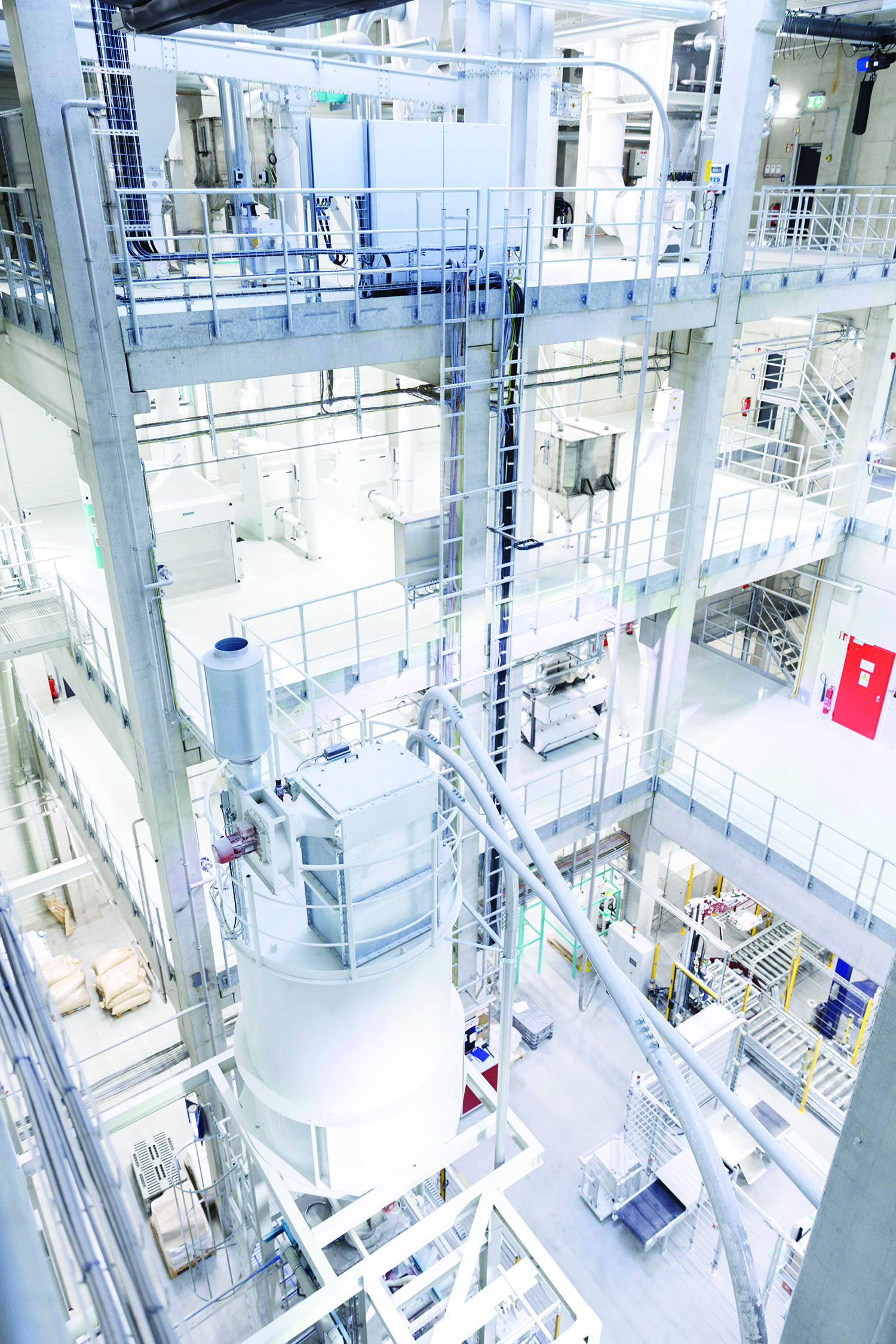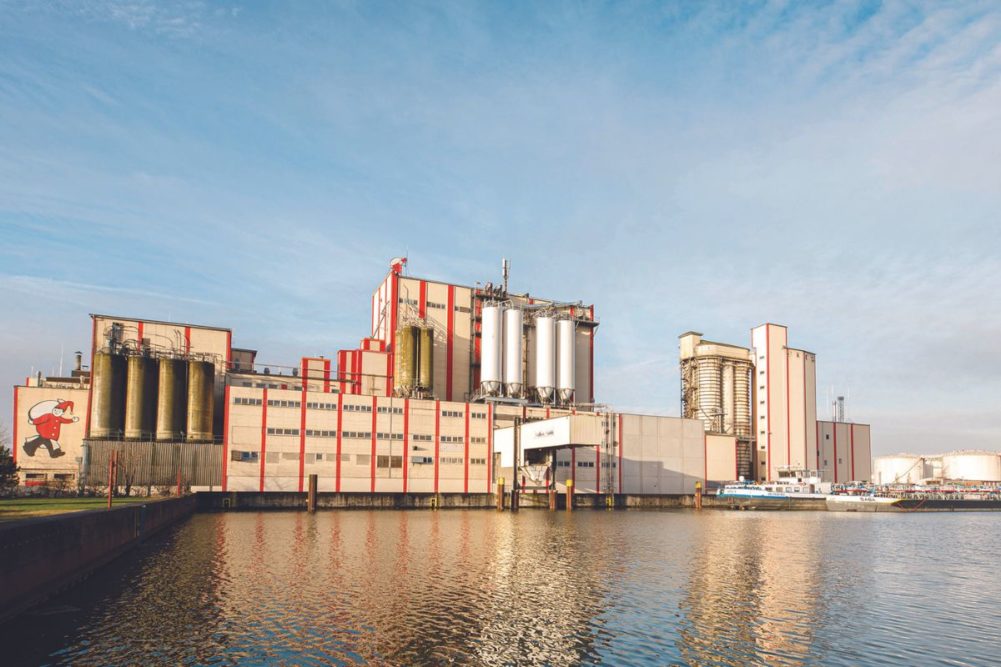WESTPHALIA, GERMANY — Müller’s Mühle has processed pulses for about 125 years, but with the accelerating trend toward healthier eating, it was time for expansion.
After a thorough analysis, the company, which is part of GoodMills Deutschland GmbH, added a pulse protein concentrate facility at its existing mill in Gelsenkirchen, Westphalia, Germany. The addition of the line allows Müller’s Mühle to enter the growth market for plant-based proteins.
“The trend toward healthier, more sustainable diets and the increased demand for meat substitutes for vegans, vegetarians or flexitarians — people who live on a predominantly vegetarian diet but occasionally consume high-quality meat — has accelerated in recent years,” said Markus Prantl, managing director at Müller’s Mühle. “We were unable to produce the protein concentrates used for these foods in line with customer requirements using our technology at the time.”
At full capacity, the new facility, which opened in 2021, can process up to five tonnes of pulses per hour into protein concentrates, or around 120 tonnes per day. The concentrates are shipped to the company’s industrial customers.
“We see our plant here in Gelsenkirchen as a foundation for a promising future,” Prantl said. “Pulses offer a lot of potential for further growth, for example as alternatives to dairy products.”
"With the exploding demand for concentrates made from pulse proteins to produce plant-based meat alternatives, it was a logical step for Müller’s Mühle to enter this market." - Randy Urban, team manager, Customer Service Sales, Bühler
History in pulses
Müller’s Mühle has specialized in the processing of plant-based raw materials since 1893. It offers an extensive range of products, and is one of the largest processors of peas, beans and lentils in Northern Europe.
From the mill in Gelsenkirchen, the company supplies wholesale and retail customers as well as the food industry throughout Europe. In addition to pulses, the company is a leader in rice processing.
Müller’s Mühle joined the GoodMills group in 1989, and with the integration of Aurora Mühlen GmbH in 2014, it also became a leading supplier of branded flour. The various flours are made from wheat, rye and spelt as well as semolina and also include baking mixes for bread and cakes.
The GoodMills Group is one of Europe’s largest milling companies with 24 production units across seven European countries and processing 2.8 million tonnes of grain. This ownership structure ensures that Müller’s Mühle has a consistent and reliable supply chain with the latest technological know-how.
The existing pulse facility processes lentils, peas, chickpeas and beans with a capacity ranging from 2.5 to 4 tph and rice with a capacity of 15 tph. The new protein concentrate line primarily processes chickpeas and yellow peas.
Protein expansion
Planning for the protein concentrate facility started years ago, with the project originating from Uzwil, Switzerland-based Bühler’s Customer Service department. Installation of the project started in the middle of a second coronavirus wave in November 2020, which required flexibility from everyone involved.
“We have been working with Bühler, in particular, for decades and are very satisfied with their expertise and service,” Prantl said.
 The processing equipment for the pulse protein concentrate line was supplied by Bühler and Hosokawa Alpine. Photo courtesy of Bühler.
The processing equipment for the pulse protein concentrate line was supplied by Bühler and Hosokawa Alpine. Photo courtesy of Bühler.Along with Bühler, Müller’s Mühle chose to work with Hosokawa Alpine, a Germany-based company specializing in the processing and handling of powders, granulates and bulk materials. Bühler and Hosokawa formed a strategic collaboration in June 2021 for the production of plant protein solutions. As part of the collaboration, Bühler provides upstream pulse processing while Hosokawa provides the technology for the dry separation of pulses’ protein, including fine grinding and air classification.
The new facility focuses just on production of pulse protein concentrate. Unlike pulse flour, the protein content in the concentrates is much higher at about 60%. To achieve this high protein content, a fine grinding is needed followed by an air classification that separates the starch (low protein content) from the concentrates (high protein content).
Bühler’s equipment and processes covers the upstream steps of the process, including coarse and fine cleaning as well as dehulling. Equipment supplied for the project includes separators, destoners, Sortex optical sorters and pulse dehullers.
The first cleaning step is a rough cleaning to remove the coarse impurities followed by a finer cleaning. After dehulling, the material is moved over to Hosokawa’s process steps. These include fine grinding and air classification steps. In this step, the protein and starch fractions are separated. The goal is to achieve the highest possible protein content and maximum yield.
“Consistently high quality throughout the entire value chain not only guarantees flawless end products, but also reduces food waste and ultimately increases Müller’s Mühle’s yield and margins,” said Alexander Langer, area sales manager, food division at Hosokawa Alpine.
Finished products are available in bulk as well as sacked. A unique selling point of the products is they are clean label, Prantl said.
Growing interest
The new facility is emblematic of an accelerating trend toward the use of pulse concentrates as meat and dairy alternatives.
“The fact that pulses are making such an incredible comeback to our menu and enable Müller’s Mühle to open up new areas of business naturally makes us very happy,” said Randy Urban, team manager customer service sales, Bühler. “But the plant here is also a sign that consumers are increasingly concerned with the impact of their diet on health, on sustainability and on our environment as a holistic system.”
Pulses can be a key to closing the protein gap and provide 50% more, or 265 million tonnes, protein for the up to 10 billion people expected by 2050. They are gluten-free, have a high fiber and protein content, are low in fat and have micronutrients such as iron, potassium, magnesium and zinc.
Lentils, beans and chickpeas require only about 160 liters of water to produce 500 grams. In comparison, 500 grams of beef requires nearly 7,000 liters of water. The agriculture industry is taking notice, increasing the production of pulses. In 2021, 9% more arable land in Germany was used for growing pulses than in the previous year.
It was no surprise to Bühler that Müller’s Mühle would want to enter the fast-growing market for meat substitute products, Urban said.
“I have been privileged to support Müller’s Mühle for many years with our solutions for processing pulses and rice,” he said. “With the exploding demand for concentrates made from pulse proteins to produce plant-based meat alternatives, it was a logical step for Müller’s Mühle to enter this market.”
The company is also part of an EU project called Smart Protein that is under the Horizon 2020 program. Its purpose is to develop ground-breaking alternative protein approaches.





